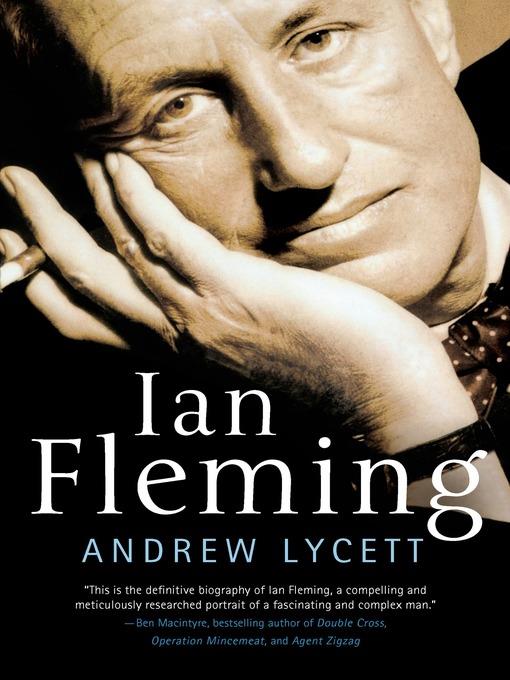
Ian Fleming
کتاب های مرتبط
- اطلاعات
- نقد و بررسی
- دیدگاه کاربران
نقد و بررسی

August 19, 2013
Exhaustive and compulsively readable, Lycett’s latest (first published in the U.K. in 1995) is billed as the first full-length Fleming biography to be published in America. Biographer Lycett (Dylan Thomas: A New Life) calls his subject “an immature child of the jazz age”—a man of wealth and privilege who shared his fictional hero James Bond’s fascination with women, gambling, and drinking. Fleming applied to Britain’s Foreign Office for a job but to no avail, but thanks to the forceful lobbying of his snobbish and well-connected mother, he was hired by the Reuters news agency in London. During WWII, he worked for Britain’s Naval Intelligence Division. One of the book’s pleasures is reading about upper-class social life before, during, and after the war: Fleming and his wife, Ann, mingled with statesmen and notable cultural figures in London and at Goldeneye, their Jamaican retreat. But Fleming did have a darker side, collecting sadomasochistic erotica and being callous to women. Lycett uncovers the seeds of Bond in Fleming’s life (though perhaps not as thoroughly as diehard fans would wish), as well as addressing the decline of Britain’s power in the postcolonial world. In this anecdote-filled account, Lycett pays tribute to Fleming’s colorful life, which was cut short by a heart attack in 1964 at age 56, just two years after Sean Connery starred in the film version of Dr. No. 8-page b&w photo insert.

November 1, 2013
An exhaustive and exhausting biography of Ian Fleming (1908-1964), the creator of secret agent James Bond. Lycett (The Man Who Created Sherlock Holmes: The Life and Times of Sir Arthur Conan Doyle, 2008, etc.) offers an overwhelming wealth of detail covering every facet and period of Fleming's life: the privileged yet turbulent boyhood, including school days at Eton (where Fleming excelled athletically if not academically), his distinguished service with the British Naval Intelligence Division in World War II, his tenures as a journalist and stockbroker (mixed results), and his phenomenal success penning the adventures of Bond. Throughout, Lycett copiously explicates Fleming's habits, social connections, many romantic affairs, tempestuous relationships with his wife and mother, housing circumstances and academic pursuits. The sheer volume of biographical detail simultaneously impresses and oppresses the reader, as a portrait of a rather unpleasant, even cruel man emerges from the vast thickets of names, dates, clubs, houses, appointments and general ephemera. Lycett's emphasis is squarely on Fleming, not his famous creation, and the subject ultimately fails to justify the author's intense attention and industry. As presented here, Fleming was a cold and callous product of privilege, a diffident man of diffuse talents. Lycett studiously reports on Fleming's writing habits, research gathering and the business aspects of the Bond books, but he doesn't offer much in the way of literary analysis or a consideration of Bond's place in popular culture. This is a densely detailed book about a man who, in the course of many other activities, wrote popular novels about a spy, not a reckoning with the creator of an enduring modern myth. Fleming scholars will find this a useful resource, but Bond aficionados won't find much to compel them. A solid scholarly biography with little to savor for general readers. Lycett's subject remains an aloof, disagreeable enigma.
COPYRIGHT(2013) Kirkus Reviews, ALL RIGHTS RESERVED.

August 1, 2013
Given the intense interest American readers and moviegoers have in James Bond, it's odd that Lycett's 1995 biography of Bond's creator, Ian Fleming, has taken this long to reach the U.S. Lycett covers lots of ground, exploring Fleming's life not merely as novelist (he published 13 Bond novels before his death at 56 in 1964) but also as journalist (he worked for Reuters and the Sunday Times), stockbroker (briefly in the 1930s), member of British Naval Intelligence (he participated in a disinformation operation designed to conceal the impending Allied invasion of Sicily), and celebrity (although he died just as the Bond movies were taking off, he enjoyed hobnobbing with the producers and stars). A certain mythology has built up around Fleming, based mostly on the facts that James Bond is a superspy and his creator worked for Naval Intelligence, and Lycett does an admirable job of bringing Fleming back down to earth, separating fact from legend while still giving Fleming his due as a larger-than-life personality. A must-read for Bond aficionados.(Reprinted with permission of Booklist, copyright 2013, American Library Association.)

























دیدگاه کاربران